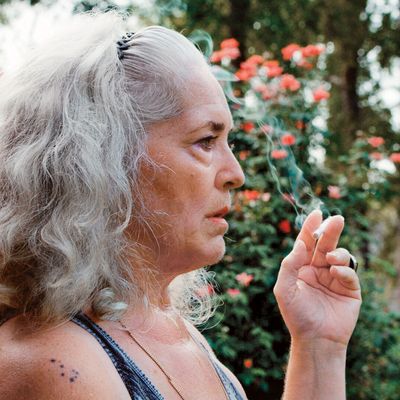
There’s an extended shot in Trey Edward Shults’s remarkable debut feature, Krisha, that’s a showstopper of bad vibes, a psycho-symphony that bumps the film to a different — more ominous — level of reality. The title character (played by Krisha Fairchild) is a bedraggled woman in her 60s who arrives for Thanksgiving at her sister’s spacious home, eager to prove to all the relatives she has hurt or abandoned that she’s different now — clean, sober, responsible, eager to belong. Too eager, maybe. She has asked to make the turkey herself, and it’s a monster; as she stands in the open kitchen, arranging her utensils, conversing with her sister and niece, the sound of her own voice drops while the surrounding noises rise. Chairs scrape, doors slam, plates clatter to the floor, someone passing murmurs into a phone, someone bounces a rubber ball. A roar goes up from the men in front of the game on TV, and the camera jerks their way and then back to the kitchen. The score (by Brian McOmber) sounds like Maxwell House–commercial percolations plus discordant plinks that might have been timed to mess with your heartbeat. Krisha seems to be moving at a different speed than the other characters. You watch her smile and nod and try to find her center, and you know that that center cannot hold. The chaos inside her unbalances the material world.
The Houston-born Shults — who’s not yet 30 — has a gift, perhaps even a genius, for translating thought and emotion into camera moves and composition. But you don’t sense that he’s controlling the action, only observing it, chasing after it. He appears in the film as Krisha’s estranged and manifestly traumatized son, and there’s a bit of his character’s helplessness in the way he gazes on the destruction.
Many of the actors are members of Shults’s family. (They use their own first names onscreen.) In interviews, he has said that the life of Krisha Fairchild (his aunt) is not the basis for the character she plays. But Shults must have discerned something in her that resisted settling down. With her shapeless clothing and long, unruly gray-streaked hair, Fairchild’s Krisha is an Earth mother who has lost all connection to the Earth and could never make it as a mother. It’s a morbid sight gag when she stands before the huge turkey holding a knife, a bandage covering the inexplicably lost top part of her finger. (Shults took poetic advantage of an accident that befell his aunt shortly before shooting.) Krisha finds a moment of peace when she sits in the backyard smoking a cigarette — as many people smoke to restore their equilibrium, for a short time. But her drily cruel brother-in-law Doyle (Bill Wise) won’t let her bromides about how much she has changed go unmolested. He gazes on her with the contempt of someone who has labored to stay strong — at the cost of his sympathy — for someone who has never fought against her own wayward impulses.
The home-for-Thanksgiving psychodrama is such a venerable subgenre that I worry I’ve made the film seem too ordinary. But Shults is such a natural Expressionist that he can gently puff the ordinary into the archetypal. Krisha has been compared to the work of John Cassavetes and, at the other, dreamier extreme, Terrence Malick (on whose films Shults has worked). But his work is sui generis, its desolation leavened by mercy. The last of many Thanksgiving guests is Krisha’s mother, who’s played by Shults’s grandmother Billie Fairchild. Fairchild has dementia, but I didn’t for an instant feel that she was being exploited. As the old woman gazes on her daughters and begins to speak of her difficulties with her own mother, you have a glimpse of an endless line of parents who weren’t there enough or were there too much. There is hell to come in Krisha, but the artist stands back from the anger — and forgives.
*This article appears in the March 21, 2016 issue of New York Magazine.


